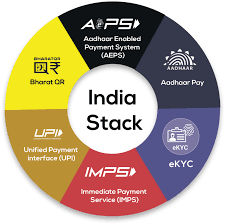SCO Adopts India’s Proposal to Support DPI | 16 May 2023
For Prelims: SCO, DPI, Aadhaar, UPI , DigiLocker
For Mains: SCO, Concept of digital public goods and its utility, Good Governance through Digital Means.
Why in News?
The Shanghai Cooperation Organisation (SCO) has recently adopted India's proposal to support the development and adoption of the country's digital public infrastructure (DPI).
- This move highlights India's leadership in the digital realm and its commitment to bridging the digital divide in the region.
What does India's DPI Proposal Entail?
- India’s DPI proposal entails supporting the development and adoption of India’s DPI by the member states of the SCO.
- The proposal includes platforms such as Aadhaar, United Payments Interface (UPI), and DigiLocker which are based on open and interoperable application programming interfaces (APIs) and enable digital inclusion, innovation, and social empowerment.
- These platforms aim to provide a robust and secure digital infrastructure for various services.
- India’s DPI proposal also entails collaborating with the SCO members on various aspects of digital public infrastructure such as design, development, implementation, evaluation, and governance.
How does India's DPI proposal benefit the SCO members?
- By offering them a model of developing their own DPI based on open and interoperable APIs.
- The proposal can help the SCO members to achieve their common goals of enhancing connectivity, trade, tourism, education, health care, and security in the region.
- It can also help the SCO members to address their common challenges of the digital divide, cyber threats, data protection, and privacy in the digital era.
What is DPI?
- DPI refers to blocks or platforms such as digital identification, payment infrastructure and data exchange solutions that help countries deliver essential services to their people, empowering citizens and improving lives by enabling digital inclusion.
- India, through India Stack, became the first country to develop all three foundational DPIs, Digital identity (Aadhar), Real-time fast payment (UPI) and Account Aggregator built on the Data Empowerment Protection Architecture (DEPA).
What is SCO?
- About:
- The SCO is a regional intergovernmental organisation that promotes cooperation between its member states in the areas of security, economy, and culture.
- Genesis:
- Prior to the creation of SCO in 2001, Kazakhstan, China, Kyrgyzstan, Russia and Tajikistan were members of the Shanghai Five.
- Following the accession of Uzbekistan to the organisation in 2001, the Shanghai Five was renamed the SCO.
- India and Pakistan became members in 2017.
- Observer States: Iran and Belarus
- Iran will be the newest member of the largest regional organisation- the SCO, when it joins the forum in 2023 under the chairmanship of India.
- Prior to the creation of SCO in 2001, Kazakhstan, China, Kyrgyzstan, Russia and Tajikistan were members of the Shanghai Five.
- Structure:
- Heads of State Council: The Supreme SCO body which decides its internal functioning and its interaction with other States & international organisations, and considers international issues.
- Heads of Government Council: Approves the budget, considers and decides upon issues related to economic spheres of interaction within SCO.
- Council of Ministers of Foreign Affairs: Considers issues related to day-to-day activities.
- Regional Anti-Terrorist Structure (RATS): Established to combat terrorism, separatism and extremism.
- Official language:
- The official working language of the SCO Secretariat is Russian and Chinese.
UPSC Civil Services Examination Previous Year’s Question (PYQs)
Prelims
Q. Consider the following statements: (2018)
1. Aadhaar card can be used as a proof of citizenship or domicile.
2. Once issued, Aadhaar number cannot be deactivated or omitted by the Issuing Authority.
Which of the statements given above is/are correct?
(a) 1 only
(b) 2 only
(c) Both 1 and 2
(d) Neither 1 nor 2
Ans: (d)
Mains
Q. Critically examine the aims and objectives of SCO. What importance does it hold for India? (2021)

